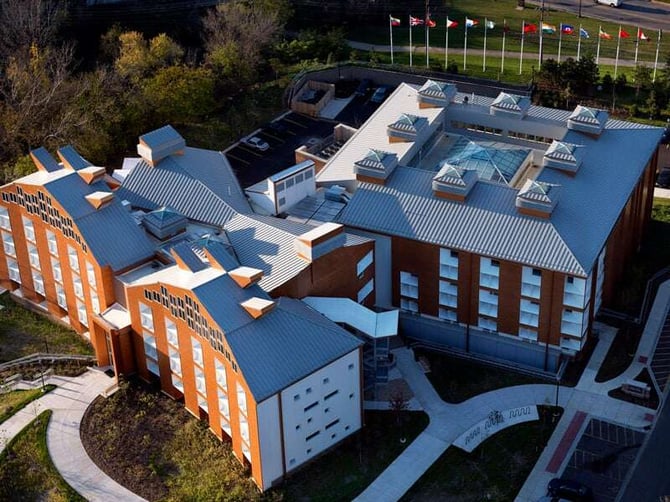- Home
- Markets
- Green/Solar
- LEED Information
Green/Solar
LEED Information
Leadership in Energy and Environmental Design (LEED)
"LEED” is an acronym for Leadership in Energy and Environmental Design. It is a whole building certification rating system instituted by the US Green Building Council. In the LEED program, a building project is awarded points in categories for compliance with established sustainability standards. Architects, designers and building owners plan a project in order to acquire points in the program to achieve a level of certification for the building project. There are many LEED programs for different types of building projects. The flagship program, LEED-NC (New Construction), uses the following categories for a project:
At McElroy Metal, we take LEED© project documentation seriously and issue only project-specific documentation for USGBC submittals. Please contact your sales representative for specific information. The chart below is provided for guidance only.

McElroy Metal Leadership in Energy and Environmental Design (LEED) Guidelines V.4
| Category | Credit | Max. # of Points | Explanation | To Learn More, Click Here: |
|---|---|---|---|---|
|
Integrative Process |
Integrative Process |
1 |
The use of energy efficient insulated McElroy Metal roofs and wall panels can be factored into your recommended energy modeling and may help achieve this credit. |
|
|
Sustainable Sites |
Heat Island Reduction |
2 |
Our Solar Reflectance Index (SRI) paints reduce surface temps and heat island affects so they are a great path to help achieve these points. |
|
|
Rain Water Management |
3 |
Sloped metal roofs are ideal for rainwater harvesting systems. A rainwater harvesting system integrated into a McElroy Metal roofing system can help manage rainwater on-site and achieve points in this category. |
||
|
Water Efficiency |
Outdoor Water Use-Reduction |
2 |
Reduce water use on-site by integrating a rainwater harvesting and landscape irrigation system into your McElroy Metal roof and you may achieve points in this category. |
|
|
Indoor Water Use-Reduction |
6 |
Reduce potable water by combining a rainwater harvesting and graywater system with your McElroy Metal roof and you may qualify for points here as well.
|
||
|
Energy & Atmosphere |
Optimize Energy Performance |
18 |
Energy efficient McElroy Metal cool metal roofing, single skin wall systems and IMP panel systems can help reduce energy demand and meet the requirements for this credit. |
|
|
Renewable Energy Production |
3 |
Metal roofing is the ideal platform for photovoltaic and/or wind generation. Using Integrated PV or solar thermal technologies with McElroy Metal roof systems can help a LEED-registeredbuilding project to qualify for these credits. |
||
|
Materials & Resources
|
Building Life-cycle Impact Reduction |
5 |
With a 50+ year life span, metal roofing and siding products can be a great asset in the quest for this credit. Point earning potential can be based on re-use of existing material or buildings or a whole building Life-cycle Assessment. |
|
|
Building Product Disclosure and Optimization-Environmental Product Declarations |
2 |
This credit encourages designers and owners towards the use of environmentally friendly products.
|
||
|
Construction & Demolition Waste Management |
2 |
The primary goal of this credit is to divert construction and demolition waste from landfills. McElroy Metal roof or wall panel systems that are fully recyclable contribute to this credit. |
||
|
Indoor Environmental Quality
|
Acoustic Performance |
1 |
McElroy Metal insulated wall and roof systems can help meet LEED criteria for composite sound transmission class (STC) ratings. |
|
|
Thermal Comfort |
1 |
Based on the excellent thermal performance of insulated metal panels, McElroy Metal wall and/or roof systems can be designed to help a LEED-registeredproject to qualify for this credit. |
||
|
Innovation |
Innovation |
5 |
McElroy Metal products integrated into the overall design can help a LEED registered project to qualify for points in this credit if the building’s design team applies strategies or measures that demonstrate performance above the requirements in various categories and /or innovative performance not specifically addressed by LEED. |

Additional Information
The information shown is intended to be only a synopsis.
- To download the complete McElroy Metal Guide for Leadership in Energy and Environmental Design (LEED) Version 4, click here: McElroy Metal LEED Credit Documentation.
- To download the steel industry's guide for Leadership in Energy and Environmental Design (LEED) Version 4, click here: LEED v4 Steel Industry Guide
- LEED V.4 no longer utilizes the credit number system.
- LEED requirements are based on all materials constructed under the project contract, of which metal products are only a portion. Credit values shown on this table reflect those available, and do not represent a guarantee of credits to be issued.
Check your local energy code regarding the use of cool roof colors. It is possible that in colder climates, darker roof colors can provide optimal energy performance.
For more information about LEED and the USGBC’s requirements for LEED Certification, please visit www.usgbc.org/LEED.
